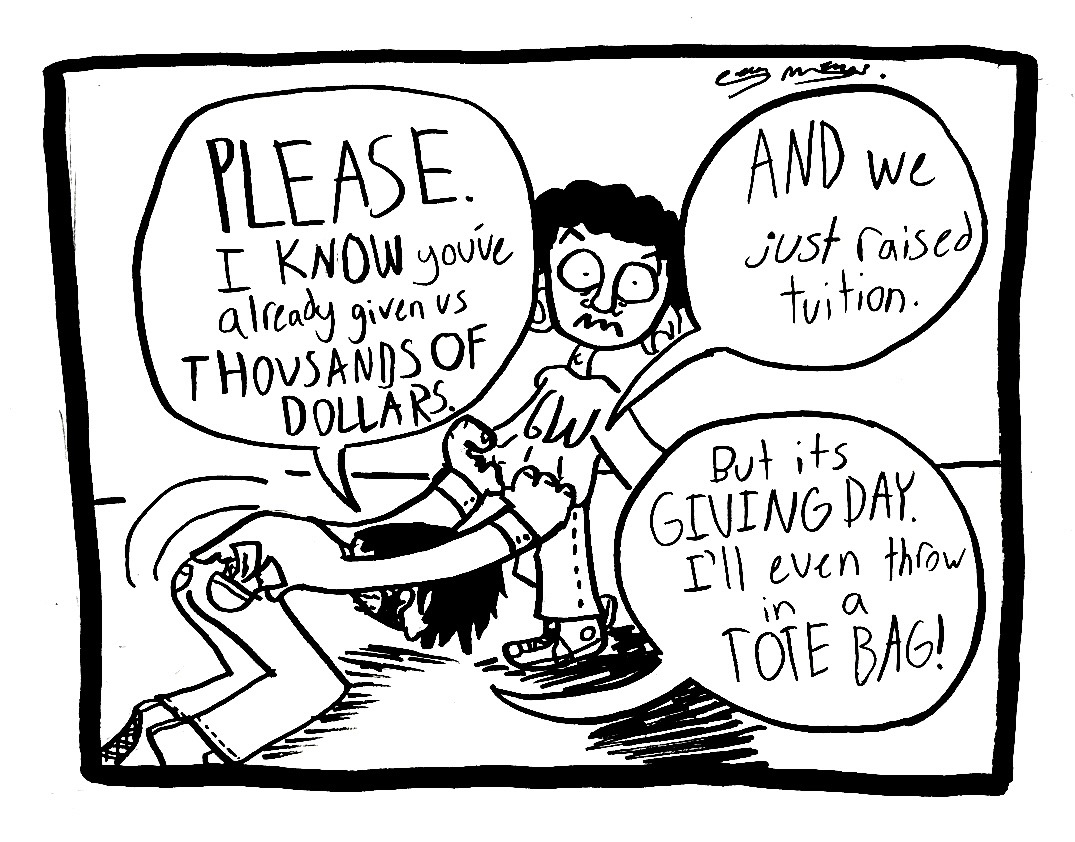While watching the latest season of the hit HBO drama “The White Lotus,” it’s easy to make light of the personifications of privilege spotlighted on the fictional Thailand resort. But the societal concepts enshrined in the hotel series also ring true on the streets of Foggy Bottom.
I first began to notice uncanny parallels between the show and my GW experience while binge-watching the third season with my roommates. The White Lotus hotel, as the height of luxury, attracts guests from all over the world who indulge in its lavish amenities while navigating personal conflicts, unspoken hierarchies and transactional friendships — sound familiar?
The satirical drama explores a different international branch of the White Lotus hotel chain each season, revolving around the lives of the often-privileged and out-of-touch guests who vacation at the hotel and later become suspects in the buildup to a mysterious death.
In the latest season set in Thailand, the show features a trio of female friends with a relationship that, for many, is close to reality. They’ve been together since childhood, but their friendship remains superficial, as it appears that the glue of their bond is their affluence. GW is no stranger to the realities of transactional friendships, just like Jaclyn, Laurie and Kate — the trio on the show. I’ve witnessed a friend group similar to this at GW who are obsessed with professional connections, chasing the approval of a student because her parents worked for the State Department. The group valued her status and the networking opportunities she offered over her actual character.
GW’s campus is home to a swath of aspiring politicians with competitive mindsets extending beyond academics and seeping into personal relationships. LinkedIn connections are collected like trophies, and students engage in a constant game of comparison regarding the network of influential professionals that they’ve amassed. In this manner, the dynamic of the three gal pals on “The White Lotus” mirrors GW’s social hierarchy through their friendship’s emphasis on wealth and power.
In the fourth episode, Jaclyn, Laurie and Kate brave the streets of Thailand, venturing outside of the luxury resort, and they appear horrified by the reality outside of the hotel’s walls. The White Lotus is reserved for the top 1 percent of society, but at the neighboring pool that they visit, they’re surrounded by older, middle-class guests, and they choose to leave immediately.
Take GW’s Foggy Bottom bubble as a case study of this dynamic. For many, there’s no real need to venture outside the boundaries of campus because it functions similarly to the White Lotus itself — a comfortable neighborhood that offers all the amenities and entertainment that students will ever need, so they’ll never be confronted with the reality of the city. Even when venturing out of the bounds of campus, some students stick to the major neighboring attractions, like the national monuments, and then tell themselves that they’ve seen all the city has to offer. But really, they’re just scratching the surface and placing more distance between themselves and the culture at the core of the city they call home, whether it’s learning about D.C.’s historic U Street or getting a taste for go-go music, the official music of the District.
And to the nepo babies of GW, don’t worry, there’s a place for you in “The White Lotus” as well. The show features Saxon, the son of a business conglomerate owner, who’s been trained since birth to take over his father’s job. For him, this prophecy was written in stone, despite the fact that there are plenty of individuals out there who could likely handle the job better. This too rings true for students at GW who expect to let their last name carry the most weight on a job application. I’ve even overheard students in pre-professional fraternities discussing how they might secure an internship by utilizing their parents’ contacts and making fun of others who have to go through the application process. This environment can create moments of casual obliviousness, and while it can be chalked up to pure ignorance, those offhand comments still sting.
Of course, it is important to acknowledge that the students of GW are not a monolith. In 2022, 44 percent of the student body received need-based financial aid. Yet 70 percent of students come from families that are in the top 20 percent of average income, as opposed to the mere 2.5 percent that come from the bottom 20 percent, indicating that GW’s general population is more affluent than the national average.
The general student body must step out of their comfort zone and connect with individuals from diverse backgrounds while also acknowledging the privilege that shapes their experiences. By doing so, they can avoid the same pitfalls that “The White Lotus” characters create for themselves due to their societal ignorance. In the end, it’s up to the individual to decide whether to embrace their privilege or challenge the system that upholds it — but perhaps don’t follow the example set by “The White Lotus.”
Ava Hurwitz, a first-year majoring in international affairs, is an opinions writer.




